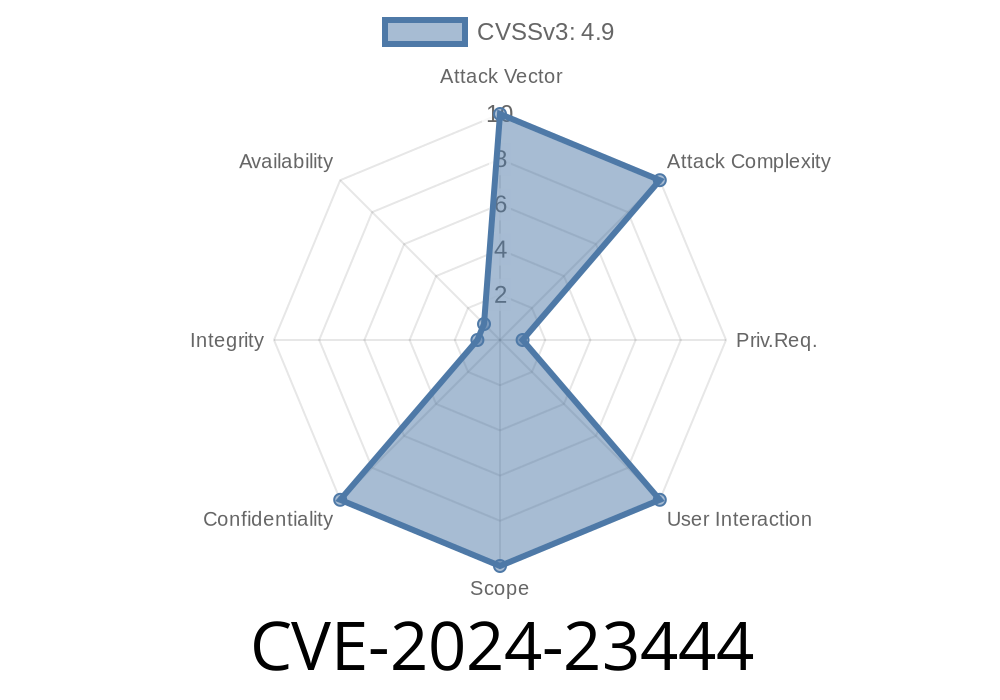On February 2024, Elastic, the team behind ElasticSearch, quietly flagged a serious security vulnerability that could impact users relying on their trusted elasticsearch-certutil command-line tool. Labeled as CVE-2024-23444, this flaw centers around how sensitive private keys are handled when generating Certificate Signing Requests (CSR). In short, your private keys might be lying around unprotected, even if you thought they were encrypted.
Let’s break down what happened, look at some code, and see how this issue could be abused—and most importantly, how to protect yourself.
What is the Issue?
Whenever you use elasticsearch-certutil to create a CSR, you might expect the associated private key to be encrypted, especially if you pass the --pass parameter on the command line. This parameter is supposed to ensure your key is protected by a password.
However, Elastic revealed a logic flaw
> The private key is written to disk unencrypted in all cases, even if you instructed the tool to secure it.
This means anyone with access to the machine had a clear shot at your unencrypted private key—potentially exposing your certificate infrastructure to man-in-the-middle attacks, impersonation, or data breach.
Here’s how you *think* it works (but due to the bug, it doesn't)
elasticsearch-certutil csr --pass mysupersecretpassword --name mynode
# Output:
# Certificate Signing Request generated at /path/to/mynode.csr
# Private key encrypted at /path/to/mynode.key (ENCRYPTED)
You expect /path/to/mynode.key to require a password to use.
Let's see a simplified code snippet (Python-like pseudocode for clarity)
def generate_csr(passphrase=None):
private_key = generate_private_key()
csr = make_csr(private_key)
# Instead of encrypting, the tool writes the raw key:
with open('private_key.pem', 'w') as f:
f.write(private_key.export()) # Unencrypted!
with open('csr.pem', 'w') as f:
f.write(csr.export())
Even if you provide a passphrase, the above code doesn't use it—leaving the private key unprotected on disk.
Suppose you’re on a shared or cloud server, and you run
elasticsearch-certutil csr --pass securePass123 --name webserver01
While you’re thinking *“My private key is safe. Only with my passphrase can anyone use it.”*, an attacker or careless admin could simply copy your /path/to/webserver01.key and use it without ever needing your password.
Is My System Affected?
Affected versions:
All ElasticSearch distributions where elasticsearch-certutil is used to generate CSRs, and especially when run on multi-user systems or build pipelines relying on the --pass parameter.
If possible, generate CSRs and keys on trusted, isolated systems.
After Elastic’s patch:
Update ElasticSearch tools to the latest fixed version as soon as it is released.
Check Elastic’s security advisories for updates.
References
- Elastic Security Announcements
- Official GitHub Issue/PR Discussion (for details/reference)
- CVE Record for CVE-2024-23444 *(Coming soon/once published)*
Conclusion
CVE-2024-23444 is a good reminder that even top-tier tools can slip up with critical basics like encrypting private keys. Don’t assume a password parameter means you’re protected. Always test, always verify.
Stay safe—watch the official channels for updates, and rotate any private keys involved if you used the vulnerable versions.
*Exclusive summary by [YOUR NAME or BLOG]*
*For full details and live updates, always visit Elastic's official channels.*
Timeline
Published on: 07/31/2024 18:15:11 UTC
Last modified on: 08/01/2024 12:42:36 UTC
